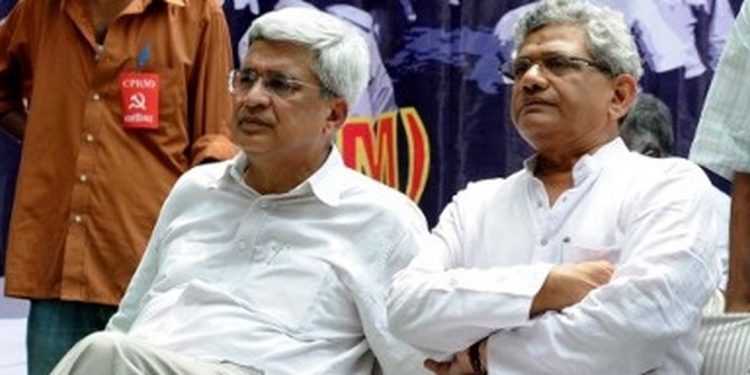The Left in India is on the firing line for its closeness to China at a time when the Sino-Indian relations are under severe strain due to the escalating border conflict in both the eastern and north-western flanks. The participation of three Left leaders, including CPI-M general secretary Sitaram Yechury, in an online seminar July 27 hosted by the Chinese Embassy in Delhi has drawn sharp criticism. At the same time, a book penned by former foreign secretary Vijay Gokhale has called into question the real motive of the withdrawal of Left support from the Congress-led UPA government on the issue of the Indo-US nuke deal in 2008. Gokhale asserts in his book that the Left’s opposition to the nuclear deal was at the behest of China.
The ostensible reason for the online seminar was the centenary celebrations of the Communist Party of China (CPC). The theme was ‘Sharing Experience on Party Building, Promoting Exchange, and Cooperation.’ There was nothing wrong in holding such an event by the Chinese embassy when China has party-to-party contact with several Left parties. It was only natural that the CPC would like to have an exchange with the Left parties on the Left movement in the world and its challenges. Yet, the Left parties in India have, once again, proven their insensitivity towards national interest. No political ideology should be allowed to clash with the interest of the people of the country. It is this sort of behavior which has distanced the Left parties from the millions of poor and toiling citizens of India. It may be noted that neither the Congress nor the BJP sent any congratulatory letters to the CPC on its centenary in view of the current strife between India and China. However, both the CPI-M and the CPI were prompt in greeting the CPC for the milestone it has reached.
The real intent of the online seminar organized by the Chinese Embassy becomes suspect as the Chinese diplomat raised the issue of border tension and even tried to justify its actions in Galwan Valley in Ladakh last year. The event was addressed by Sun Weidong, Ambassador of China to India and the Left participants were CPI(M) general secretary Sitaram Yechury, CPI general secretary D Raja, All India Forward Bloc secretary G Devarajan and DMK Lok Sabha MP S Senthil Kumar.
The Chinese Ambassador’s speech explaining the rise of the CPC and the pace of development in the country under the leadership of President Xi Jinping was on predictable lines. But, questions are being raised about diplomatic propriety and the silence of the Left leaders over Ambassador Sun’s reference to the Galwan Valley incident and his assertion that the matter of right and wrong was clear in the incident.
The Left, however, defended the decision to attend the seminar arguing that the government itself is engaged with China on several issues. Yechury was smart enough to deflect criticism by asserting that the programme had nothing to do with India-China relationship.
The charge brought by former foreign secretary Gokhale against the Left is far more serious as he claims in his book that the Left’s opposition to the Indo-US nuclear deal between 2007 and 2008 was the “first instance for China to operate politically in Indian domestic politics.” As Joint Secretary (East Asia), Gokhale was handling the country’s affairs with China in the Ministry of External Affairs when the deal was being negotiated. India got a waiver from the Nuclear Suppliers’ Group (NSG) after Beijing relented. During his nearly four-decade-long diplomatic career Gokhale spent over 20 years in China and seven years on the China desk in MEA. He is supposed to be proficient in Mandarin as well and has served as India’s Ambassador to China.
As such his charge about the Left’s alleged complicity with China in blocking the nuke deal carries weight. In fact, there has always been room for suspicion about then CPI-M general secretary Prakash Karat’s adamant attitude in forcing the UPA government to cancel the nuke deal or else the Left would withdraw its support from it. The Bengal unit of the CPI-M was divided on the Left stance as many among the front ranking leaders, including Late Somnath Chatterjee, the then Speaker of Lok Sabha, did not find any justification for pulling out of the government on the nuclear issue. Moreover, the Left then having the highest number of MPs – 60 – in its history was virtually doing back-seat driving of the government.
The worst fallout of the decision was the subsequent decimation of the Left in its bastion in West Bengal and then Tripura. The party has now been reduced to a virtual signboard organisation in Bengal. The entire Left could not win a single seat in the recently held Bengal Assembly polls.
One reason for the obduracy of Karat and his followers in withdrawing Left support from the UPA government could be China’s insistence that the deal should be scrapped as it was not in its interest. Even after the publication of Gokhale’s book, Karat has justified his decision on the ground that the opposition stemmed from worries that the deal would lead to consolidation of US militarization in the region and the current situation proves the Left stand was right.
But, the question survives how such a decision could be taken when it could be easily understood that the Left in that event would lose its preeminent position in the Parliament, chalking up the highest ever tally. Seemingly, the Left was then more interested in safeguarding China’s interest than its own. Subsequent events have shown how suicidal the decision was. It was nothing short of political harakiri. Gokhale may have ample reason for his conclusion on the Left-China nexus.







































